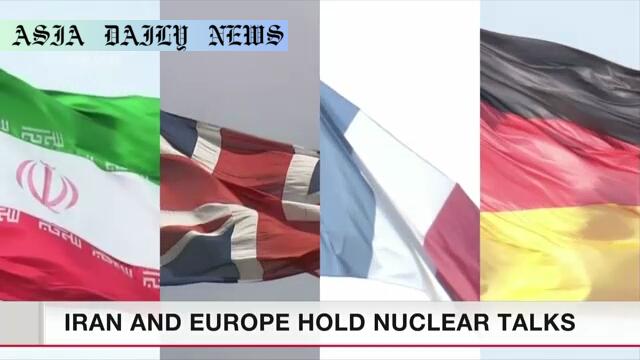Nuclear talks: Iran and European nations meet amid escalating tensions and looming UN sanctions.
- Nuclear talks between Iran and European nations held in Turkey after recent nuclear site attacks.
- European powers warn of UN sanctions if progress isn’t reached by August deadline.
- Iran steadfast on nuclear enrichment program despite diplomatic pressures.
- Meeting ends with agreement to continue discussions but tensions remain unresolved.
- Cooperation with the IAEA and uranium accountability on the negotiation table.

Introduction: A Renewed Push Amid High-Stakes Tensions
The international diplomatic arena witnessed a critical engagement this Friday as vice-ministerial officials from Iran and European powers, including Britain, France, and Germany, convened in Turkey to discuss the embattled nuclear agreement with Tehran. The backdrop to these deliberations is steeped in urgency following a precarious escalation—Israeli and U.S. strikes targeting Iranian nuclear facilities last month, further complicating the already-teetering accord.
During the four-hour session at the Iranian Consulate, both sides presented their positions with candor. This meeting served as a strategic attempt to revive negotiations that have been riddled with a prolonged stalemate, underscoring the high stakes involved. The European delegation emphasized the looming August deadline, which, if unmet, could trigger the “snapback” mechanism. This automatic re-imposition of pre-2015 UN Security Council sanctions represents a significant threat to Iran’s global standing and economy.
The Core of the Conflict: Uranium and International Oversight
One of the central sticking points in the ongoing discourse pertains to uranium enrichment levels. Western diplomats have repeatedly raised concerns about the whereabouts of highly enriched uranium that went missing following last month’s strikes. Tehran’s steadfast position to uphold its nuclear enrichment program has drawn criticism, with European powers calling for greater transparency and cooperation with the International Atomic Energy Agency (IAEA).
The IAEA, tasked with ensuring the peaceful application of nuclear technology, has been pressing Iran for an account of its activities. European powers believe this transparency is pivotal to reinstate trust and prevent escalations. Iran, however, remains cautious, deeming such demands as intrusive while emphasizing its sovereign rights to nuclear advancement.
Aftermath of the Talks: Positive Rhetoric Amid Lingering Uncertainties
Emerging from the closed-door discussions, Iran’s Deputy Foreign Minister, Kazem Gharibabadi, took to the social media platform “X” to describe the talks as “serious, frank, and detailed.” He further reiterated Iran’s principled stance, particularly highlighting the potential repercussions of UN sanctions. Despite the heated exchanges, both parties concurred on the necessity for continued consultations. This is a promising signal of intent, even as substantial progress remains elusive.
While these discussions signify a step forward, one cannot overlook the tenuous foundation upon which they stand. The stakes are particularly high for Iran, whose economy is already buckling under the weight of existing sanctions. For the European countries involved, the urgency is equally pronounced, as they juggle international security concerns with the merits of diplomatic persuasion.
Conclusion: High Stakes, Limited Time
As the clock ticks toward August, the path to stability remains fraught with challenges. The ongoing negotiations represent a pivotal juncture that could define the trajectory of regional and global dynamics surrounding nuclear proliferation. While diplomatic channels have been kept open, the need for actionable strategies that address the concerns of all parties remains key to a lasting resolution. The world now waits with bated breath to see whether these talks will yield sustainable progress or devolve into yet another stalemated chapter in the complex saga of Iranian nuclear diplomacy.



Commentary
Understanding Europe’s Position in the Talks
The recent meeting between diplomatic officials from Iran and European powers demonstrates Europe’s delicate balancing act—striving to ensure non-proliferation while avoiding further escalation. With a looming deadline for reinstating sanctions, the stakes couldn’t be higher. Europe is attempting to navigate the tightrope between asserting pressure on Iran to comply with international norms and maintaining diplomatic channels open to avoid the resurgence of hostilities.
Tehran’s commitment to its nuclear enrichment program poses a significant challenge. The insistence on transparency in uranium inventory and cooperation with the International Atomic Energy Agency underscores Europe’s focus on accountability. By making these demands, European powers aim to stabilize tensions, but the conversation also treads on highly sensitive political territory for the Iranian leadership, limiting room for compromise.
Iran’s Resilience Facing Mounting Pressure
For Iran, upholding its nuclear ambitions is not just a matter of policy but a symbol of sovereignty. The recent strikes on its nuclear facilities by Israel and the U.S. have only entrenched Tehran’s position further. Viewed through the lens of Iran’s leadership, compromising on such matters may signal weakness—something it can ill afford amid global and internal scrutiny.
However, the path forward for Iran is fraught with economic risks, especially with the potential snapback of UN sanctions. With these sanctions comes the prospect of further isolating an already strained national economy. The urgency to bridge this divide should therefore be a shared priority for all stakeholders.
The Road Ahead: Opportunities and Risks
The discussions in Turkey, although inconclusive, serve as a foundation for continued dialogue—a crucial lifeline amidst unpredictable geopolitical currents. Both sides appear willing to explore avenues of compromise, provided mutual interests are addressed. Time, however, is of the essence. The August deadline casts a long shadow over the deliberations, making it imperative for both Europe and Iran to reach substantial agreements before the tipping point is reached.